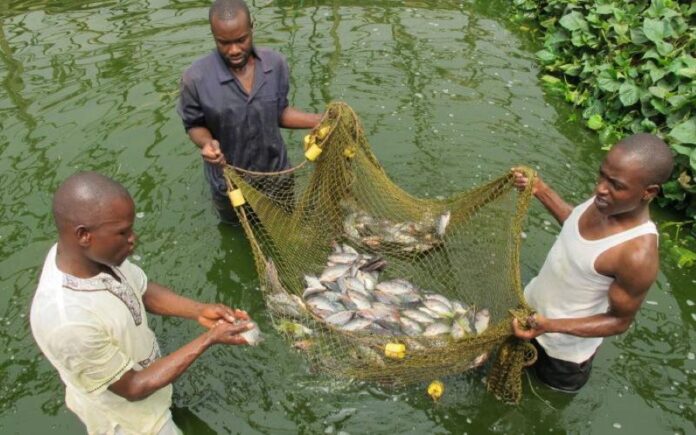A recent study by OLUDIPE, B and OMOLOLA L,O. (2024) titled “SURMOUNTING THE CHALLENGES OF POVERTY THROUGH AQUACULTURE FARMING IN OGUN STATE, NIGERIA” published in AAU Journal of Business Educators, shows that aquaculture farming has significantly improved the income levels of participating households, helping to alleviate poverty.
“
Aquaculture significantly boosts income, creates jobs, and enhances food security, alleviating poverty in Ogun State.– OLUDIPE, B and OMOLOLA L,O. 2024
The article explores aquaculture as a powerful means to alleviate poverty in the region by generating employment opportunities and enhancing food security. It underscores the vital role that aquaculture can play in transforming the economic landscape of Ogun State, particularly in rural areas where poverty is most pervasive. Aquaculture, or fish farming, has the potential to provide a sustainable source of income for local communities, thus reducing their reliance on subsistence agriculture, which is often vulnerable to climatic changes and market fluctuations. By creating jobs and stimulating local economies, aquaculture can significantly contribute to poverty reduction. Additionally, it can improve nutritional outcomes by increasing the availability of affordable, high-protein food sources, thereby addressing food insecurity. However, the article also highlights several challenges that impede the growth of aquaculture in Ogun State. These include inadequate funding, which limits the ability of farmers to invest in necessary equipment and resources; a lack of technical knowledge, which hinders farmers from adopting best practices; and poor infrastructure, such as inadequate access to water resources and transportation networks, which makes it difficult to sustain and scale operations.
How the study was conducted
The authors distributed surveys and questionnaires to local farmers to gather information on their experiences, challenges, and needs. The authors conducted interviews with key stakeholders, including government officials, aquaculture experts, and community leaders, to gain deeper insights. The authors visited various aquaculture farms to observe practices, infrastructure, and the overall environment. The study review of existing literature, reports, and statistics related to aquaculture and poverty alleviation in the region. Both qualitative and quantitative data were analyzed to identify patterns, challenges, and potential solutions. This comprehensive approach allowed the researchers to develop well-rounded recommendations and highlight successful strategies from other regions.
What the authors found
The authors found that aquaculture farming has significantly improved the income levels of participating households, helping to alleviate poverty. The study posits that the sector has created numerous job opportunities, particularly for youth and women, contributing to reduced unemployment rates.
Why is this important?
Poverty Alleviation: The study demonstrates how aquaculture can significantly improve the income levels of local households, providing a sustainable way to lift people out of poverty.
Employment Creation: By highlighting the job opportunities created, especially for youth and women, the study shows how aquaculture can reduce unemployment and empower marginalized groups.
Food Security: Aquaculture contributes to food security by increasing the availability of fish, a vital source of protein, thus improving the nutritional status of the community.
Sustainable Development: The emphasis on sustainable practices ensures that the benefits of aquaculture can be enjoyed long-term without degrading the environment.
Policy Guidance: The study provides valuable recommendations for policymakers to support and enhance aquaculture initiatives, which can lead to more effective and targeted interventions.
What the authors recommended
- The authors suggest that the government should provide more financial assistance and subsidies to local farmers to help them overcome funding challenges.
- The authors advocate that implementing comprehensive training programs to improve farmers’ technical knowledge and skills in aquaculture practices is crucial.
- The study recomment investing in better infrastructure, such as improved water supply systems and transportation networks, to support aquaculture activities.
- Facilitating easier access to credit facilities for farmers to enable them to invest in necessary equipment and resources.
- In addition, creating better market linkages and opportunities for farmers to sell their produce, ensuring they get fair prices and reducing post-harvest losses.
- Furthermore, promoting sustainable aquaculture practices to ensure long-term environmental and economic benefits.
In conclusion, the study underscores the transformative potential of aquaculture farming in Ogun State as a robust tool for poverty alleviation and economic development. By creating job opportunities, enhancing food security, and improving income levels, aquaculture offers a promising path towards sustainable growth in rural communities. Despite existing challenges such as inadequate funding, technical knowledge gaps, and infrastructure limitations, the recommendations provided aim to address these issues and unlock the full potential of this sector. With targeted support and strategic investments, aquaculture can drive significant positive change, fostering both economic resilience and improved quality of life for local residents.
















 The African Research (AR) Index is a comprehensive scholarly directory and database focused explicitly on journal publishers that publish and disseminate African research.
The African Research (AR) Index is a comprehensive scholarly directory and database focused explicitly on journal publishers that publish and disseminate African research.

